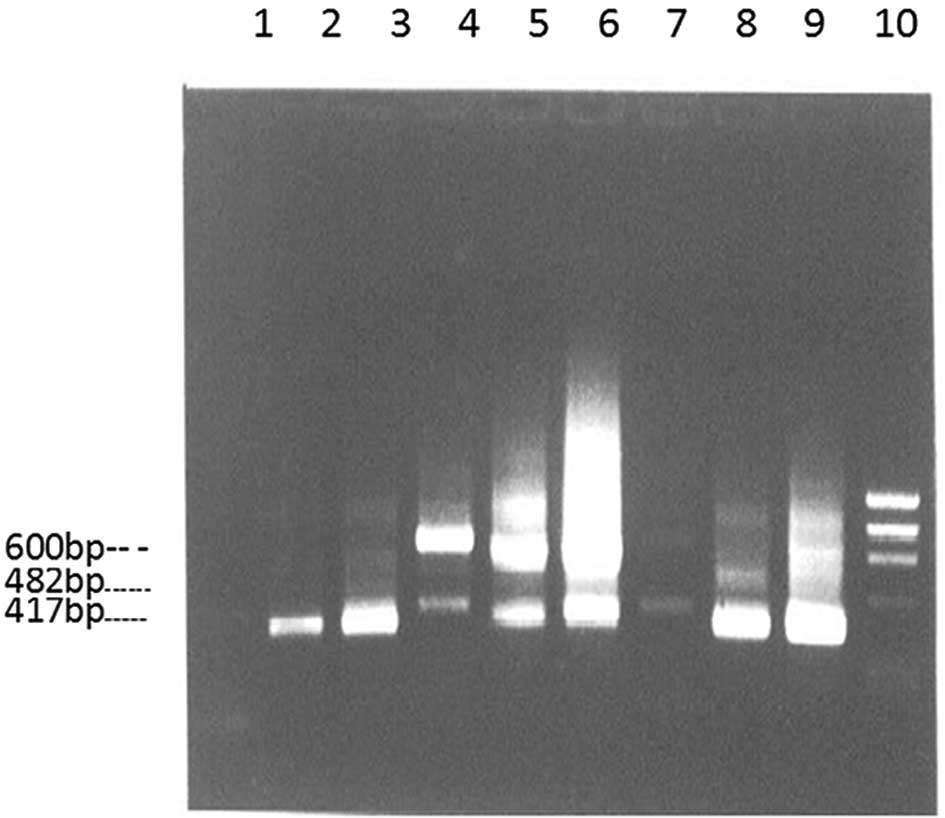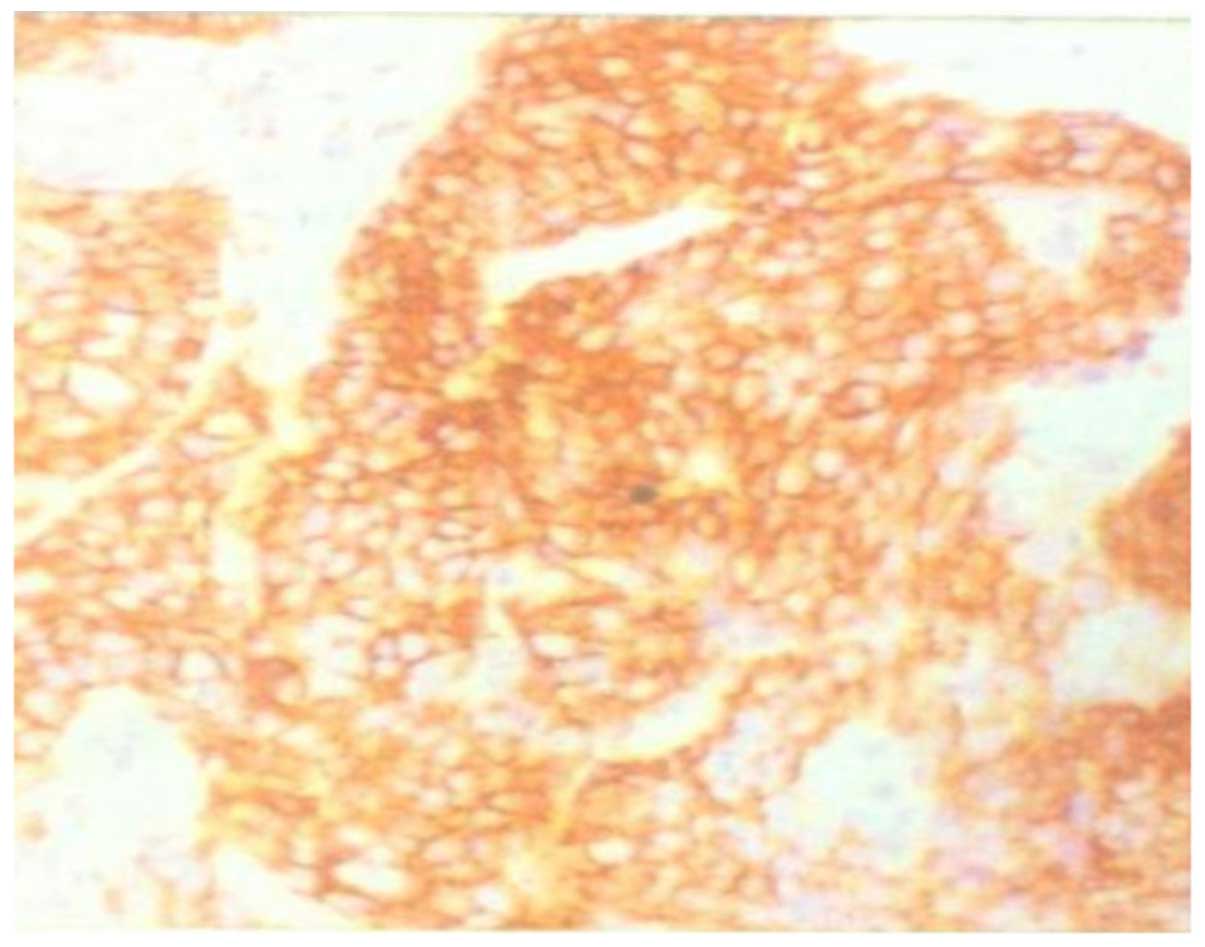|
1
|
Orditura M, Galizia G, Sforza V, et al:
Treatment of gastric cancer. World J Gastroenterol. 20:1635–1649.
2014. View Article : Google Scholar : PubMed/NCBI
|
|
2
|
Wielenga VJ, Heider KH, Offerhaus GJ, et
al: Expression of CD44 variant proteins in human colorectal cancer
is related to tumor progression. Cancer Res. 53:4754–4756.
1993.PubMed/NCBI
|
|
3
|
Hsu KH, Tsai HW, Shan YS and Lin PW:
Significance of CD44 expression in gastrointestinal stromal tumors
in relation to disease progression and survival. World J Surg.
31:1438–1444. 2007. View Article : Google Scholar : PubMed/NCBI
|
|
4
|
Quiding-Järbrink M, Ahlstedt I, Lindholm
C, Johansson EL and Lönroth H: Homing commitment of lymphocytes
activated in the human gastric and intestinal mucosa. Gut.
49:519–525. 2001. View Article : Google Scholar : PubMed/NCBI
|
|
5
|
East JA and Hart IR: CD44 and its role in
tumour progression and metastasis. Eur J Cancer. 29A:1921–1922.
1993. View Article : Google Scholar : PubMed/NCBI
|
|
6
|
Herrlich P, Zöller M, Pals ST and Ponta H:
CD44 splice variants: Metastases meet lymphocytes. Immunol Today.
14:395–399. 1993. View Article : Google Scholar : PubMed/NCBI
|
|
7
|
Xin Y, Grace A, Gallagher MM, Curran BT,
Leader MB and Kay EW: CD44V6 in gastric carcinoma: A marker of
tumor progression. Appl Immunohistochem Mol Morphol. 9:138–142.
2001. View Article : Google Scholar : PubMed/NCBI
|
|
8
|
Finn L, Dougherty G, Finley G, Meisler A,
Becich M and Cooper DL: Alternative splicing of CD44 pre-mRNA in
human colorectal tumors. Biochem Biophys Res Commun. 200:1015–1022.
1994. View Article : Google Scholar : PubMed/NCBI
|
|
9
|
Yamaguchi A, Saito M, Gio T, et al:
Expression of CD44 variant exons 8–10 in gastric cancer. Jpn J
Cancer Res. 86:1166–1171. 1995. View Article : Google Scholar : PubMed/NCBI
|
|
10
|
Ghaffarzadehgan K, Jafarzadeh M, Raziee
HR, et al: Expression of cell adhesion molecule CD44 in gastric
adenocarcinoma and its prognostic importance. World J
Gastroenterol. 14:6376–6381. 2008. View Article : Google Scholar : PubMed/NCBI
|
|
11
|
Yamaguchi A, Goi T, Yu J, et al:
Expression of CD44v6 in advanced gastric cancer and its
relationship to hematogenous metastasis and long term prognosis. J
Surg Oncol. 79:230–235. 2002. View Article : Google Scholar : PubMed/NCBI
|
|
12
|
Sasaki JI, Tanabe KK, Takahashi K, et al:
Expression of CD44 splicing isoforms in lung cancers: Dominant
expression of CD44v8-10 in non-small cell lung carcinomas. Int J
Oncol. 12:525–533. 1998.PubMed/NCBI
|
|
13
|
Ahn MJ, Noh YH, Yoon HJ, et al: Detection
of malignant cells in pleural fluid or ascites by CD44v8-10/CD44v10
competitive RT-PCR. Korean J Int Med. 16:30–35. 2001. View Article : Google Scholar
|
|
14
|
Miyake H, Eto H, Arakawa S, Kamidono S and
Hara I: Over expression of CD44V8-10 in urinary exfoliated cells as
an independent prognostic predictor in patients with urothelial
cancer. J Urol. 167:1282–1287. 2002. View Article : Google Scholar : PubMed/NCBI
|
|
15
|
Lau WM, Teng E, Chong HS, et al: CD44v8-10
is a cancer-specific marker for gastric cancer stem cells. Cancer
Res. 74:2630–2641. 2014. View Article : Google Scholar : PubMed/NCBI
|
|
16
|
Hu B, El Hajj N, Sittler S, Lammert N,
Barnes R and Meloni-Ehrig A: Gastric cancer: Classification,
histology and application of molecular pathology. J Gastrointest
Oncol. 3:251–261. 2012.PubMed/NCBI
|
|
17
|
Matsumura Y and Tarin D: Significance of
CD44 gene products for cancer diagnosis and disease evaluation.
Lancet. 340:1053–1058. 1992. View Article : Google Scholar : PubMed/NCBI
|
|
18
|
Takeuchi K, Yamaguchi A, Urano T, Goi T,
Nakagawara G and Shiku H: Expression of CD44 variant exons 8–10 in
colorectal cancer and its relationship to metastasis. Jpn J Cancer
Res. 86:292–297. 1995. View Article : Google Scholar : PubMed/NCBI
|
|
19
|
Chomczynski P and Sacchi N: Single-step
method of RNA isolation by acid guanidinium
thiocyanate-phenol-chloroform extraction. Anal Biochem.
162:156–159. 1987. View Article : Google Scholar : PubMed/NCBI
|
|
20
|
Mathew J, Hines JE, Obafunwa JO, Burr AW,
Toole K and Burt AD: CD44 is expressed in hepatocellular carcinomas
showing vascular invasion. J Pathol. 179:74–79. 1996. View Article : Google Scholar : PubMed/NCBI
|
|
21
|
Haynes BF, Telen MJ, Hale LP and Denning
SM: CD44 - a molecule involved in leukocyte adherence and T-cell
activation. Immunol Today. 10:423–428. 1989. View Article : Google Scholar : PubMed/NCBI
|
|
22
|
Mackay CR, Terpe HJ, Stauder R, Marston
WL, Stark H and Günthert U: Expression and modulation of CD44
variant isoforms in humans. J Cell Biol. 124:71–82. 1994.
View Article : Google Scholar : PubMed/NCBI
|
|
23
|
Shiozaki H, Oka H, Inoue M, Tamura S and
Monden M: E-cadherin mediated adhesion system in cancer cells.
Cancer. 77(Suppl): S1605–S1613. 1996. View Article : Google Scholar
|
|
24
|
Wang T, Ong CW, Shi J, et al: Sequential
expression of putative stem cell markers in gastric carcinogenesis.
Br J Cancer. 105:658–665. 2011. View Article : Google Scholar : PubMed/NCBI
|
|
25
|
Yokozaki H, Ito R, Nakayama H, Kuniyasu H,
Taniyama K and Tahara E: Expression of CD44 abnormal transcripts in
human gastric carcinomas. Cancer Lett. 83:229–234. 1994. View Article : Google Scholar : PubMed/NCBI
|
|
26
|
Takaishi S, Okumura T, Tu S, et al:
Identification of gastric cancer stem cells using the cell surface
marker CD44. Stem Cells. 27:1006–1020. 2009. View Article : Google Scholar : PubMed/NCBI
|
|
27
|
Miwa T, Watanabe A, Yamada Y, et al:
Progression in gastric carcinoma relative to the ratio of CD44
epithelial variant transcript to CD44 hematopoietic variant
transcript. Cancer. 77:25–29. 1996. View Article : Google Scholar : PubMed/NCBI
|
|
28
|
Chen GY and Wang DR: The expression and
clinical significance of CD44v in human gastric cancers. World J
Gastroenterol. 6:125–127. 2000.PubMed/NCBI
|
|
29
|
Mayer B, Jauch KW, Günthert U, et al:
De-novo expression of CD44 and survival in gastric cancer. Lancet.
342:1019–1022. 1993. View Article : Google Scholar : PubMed/NCBI
|
|
30
|
Miyake H, Okamoto I, Hara I, et al: Highly
specific and sensitive detection of malignancy in urine samples
from patients with urothelial cancer by CD44v8-10/CD44v10
competitive RT-PCR. Int J Cancer. 79:560–564. 1998. View Article : Google Scholar : PubMed/NCBI
|
|
31
|
Okamoto I, Morisaki T, Sasaki J, et al:
Molecular detection of cancer cells by competitive reverse
transcription-polymerase chain reaction analysis of specific CD44
variant RNAs. J Natl Cancer Inst. 90:307–315. 1998. View Article : Google Scholar : PubMed/NCBI
|
















